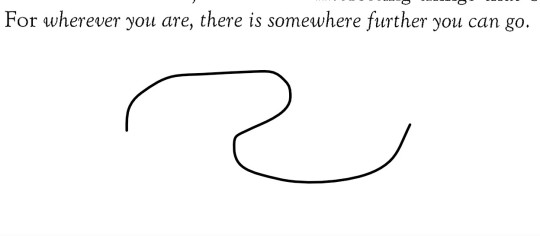#tim ingold
Text

54 notes
·
View notes
Text
The human genotype, in short, is a fabrication of the modern scientific imagination. This does not mean, of course, that a human being can be anything you please. But it does mean that there is no way of describing what human beings are independently of the manifold historical and environmental circumstances in which they become - in which they grow up and live out their lives.
Ingold, T. (2006) Against Human Nature, p. 273
26 notes
·
View notes
Quote
Through living in it, the landscape becomes a part of us, just as we are part of it.
Tim Ingold, The Temporality of the Landscape
36 notes
·
View notes
Text
"It is not enough to observe, in a now rather dated anthropological idiom, that hunter gatherers live in 'stateless societies', as though their social lives were somehow lacking or unfinished, waiting to be completed by the evolutionary development of a state apparatus. Rather, the principal of their socialty, as Pierre Clastres has put it, is fundamentally against the state."
- Tim Ingold
16 notes
·
View notes
Photo
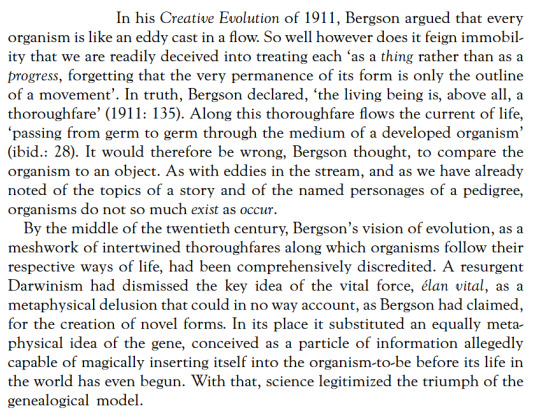
Tim Ingold, Lines: A Brief History
15 notes
·
View notes
Photo

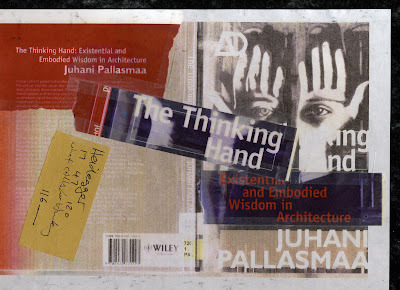


(via Inquiry is essentially the way of learning : Fragile Architectures of Hapticity and Time)
#Hapticity#Architecture#Collage#Francesca Woodman#Neil Leach#Bricolage#Environments#Peter Lodermeyer#Andrew Todd#Peter Brook#Juhani Pallasmaa#Jennifer A. H. Shields#Anne Cline#Scriptorium#Tim Ingold#MA Interiors#Waverley Inquiry 2013#Russell Moreton
4 notes
·
View notes
Text
2022/07/04 English
Today I worked late. In the morning I read Tim Ingold's "Being Alive". I was a bit surprised because this book discusses a topic I am just interested in now. Being alive means not staying still but starting moving. For example, walking, thinking, writing, and talking. Start doing actual action. This book tells us about them (I think so). These actions change this world, and the world reacts to our actions. It causes another dynamic change... It's quite an exciting book.
I attended a discussion about the 'low birthrate and aging society' topic on an 'openchat' on LINE. We should accept immigrants or expect the development of AI... a member said that this problem lets people who have never done helping aged people grow up by helping people actually. Indeed, helping aged people might be tough work... but it made me have a difficult feeling. I can see that working hard and facing difficult things let us grow through my life experience. But it might go to a brutal logic of 'black companies'.
Recently I listen to Joichi Ito's podcast on Spotify. Especially I have a certain concern about the broadcasting with Kenichiro Mogi. Joichi Ito says he also creates a community on Discord. He found a possibility on Discord... which makes me impressed. What does he think? I want to know. With Kenichiro Mogi, he talks about neurodiversity and metaverse, and a brilliant future with technology that has been changing our society exactly. It might be 'a pie in the sky'. But I bet this bright future.
At night I remembered my life. I have lived until now... Exactly I couldn't become a bestseller writer. I would never become that. But I am satisfied with what I am writing. And I have some great readers. Unbelievable... and amazing. I have achieved this state. Also, I have built this skill of speaking English. Of course, I will keep on writing. But now I accept my current state and feel happiness. I lost my hungry spirit... is it OK?
4 notes
·
View notes
Text
For Attention: art in the fold of education

Welcome to For Attention. Art in the fold of Education, a two-day doctoral colloquium of the research cluster Art, Pedagogy and Society (Image, LUCA School of Arts, Ghent) on May 2 and 3.
The doctoral colloquium focuses on the role of education in the cluster Art, Pedagogy and Society. The researchers will present how their artistic research corresponds to education. For this occasion, we invite Tim Ingold, professor emeritus of social anthropology at University of Aberdeen, who relates anthropology, art and education. He will attend the colloquium and give a public lecture on LEADING OUT AND LEANING OVER: THE POSTURE OF EDUCATION IN THE WORK OF GENERATIONS. The public lecture takes place on May 2 at 18u.
Please register for the doctoral colloquium and the public lecture via the link before 26 April.
Timetable
May 2
(002) – the lecture of Tim Ingold will take place at C23, the reception at C15
09h30 coffee and tea
09h45 introduction of the doctoral colloquium: Nancy Vansieleghem
10h00 doctoral presentations: Ciel Grommen, Stijn Van Dorpe & Roel Kerkhofs
13h00 lunch by Fiona Hallinan
14h00 doctoral presentations: Fiona Hallinan & Paul Nieboer
16h00 coffee break
16h30 filmscreening school: Nancy Vansieleghem & Julie Lesenne
18h00 public lecture by Tim Ingold
19h30 reception
May 3
(002)
09h30 coffee and tea
10h00 doctoral presentations: Dragana Radanoviç, Mattijs Driesen & Ziya Lemin
13h00 lunch
14h00 general discussion and closure of the doctoral colloquium
Kind regards,
research cluster Art, Pedagogy and Society
0 notes
Text
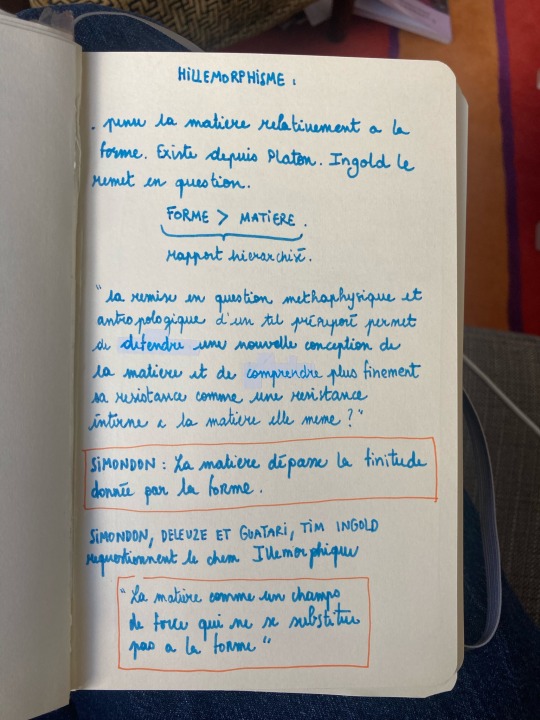
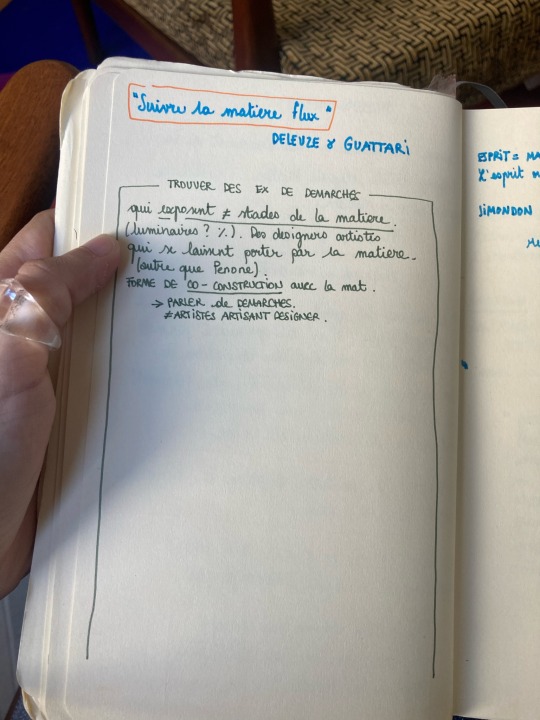

1 note
·
View note
Text
Anthropology, in my definition, is philosophy with the people in.
Tim Ingold, Anthropology: Why it Matters (2018)
23 notes
·
View notes
Text

Tim Ingold, Architektura jako tkanie, s. 2
0 notes
Text
For it is indeed the case that while affirming human unity under the rubric of a single sub-species, we do so in terms that celebrate the historical triumph of Western civilisation. It is not hard to recognise, in the suite of capacities with which all humans are said to be innately endowed, the central values and aspirations of our own society, and of our own time. Thus we are inclined to project an idealised image of our present selves onto our prehistoric forebears, crediting them with the capacities to do everything we can do and have ever done in the past, such that the whole of history appears as a naturally preordained ascent towards the pinnacle of modernity. The bias is all too apparent in comparisons between ourselves and people of other cultures. Thus where we can do things that they cannot, this is typically attributed to the greater development, in ourselves, of universal human capacities. But where they can do things that we cannot, this is put down to the particularity of their cultural tradition. This kind of reasoning rests on just the kind of double standards that have long served to reinforce the modern West’s sense of its own superiority over ‘the rest’, and its sense of history as the progressive fulfilment of its own, markedly ethnocentric vision of human potentials.
Ingold, T. (2006) Against Human Nature, p. 279
0 notes
Text

What if I "pursued" you with the bloodthirst of a thousand hungry wolves, Tim? What would you do then?
#uni adventures#GET ON WITH IIIIIIT#it's so hard to be a tim ingold enjoyer. he is so irritating to me but he occasionally makes really interesting points#so i have to suffer the irritation
3 notes
·
View notes
Text
god it kills me that I spoke with a famous anthropologist whose work I really like during a debate in undergrad and I have ZERO memory of it
#thanks to my classmate Ed for recording the fact I asked Tim Ingold a question#because otherwise I'd be like 'I wish I could meet him' when I have in fact met him#shut up em
11 notes
·
View notes
Text
AADHD: A for adult/academic

Each working day I read and write. For me reading is the best warm-up for writing as my brain gets activated and I cannot wait to respond to the reading I'm doing - a connection to be made with existing thoughts, a comparison, a critique... There is certainly a kind of ego going on because sharpness means I can quickly respond to a new knowledge: "This fits MY framework here"..."This changes MY way of thinking of ..." "I disagree because...".
A quick glance of my note book for the past half a month (organized as "Book I read" - "Topic I wrote":
8/27: What Difference does Deleuze's Difference Make, Boundas, 2006 - writing on virtual and actual
8/28: Imagining for Real, Tim Ingold - writing on knowledge, transition and vision
8/29: Imagining for Real, Tim Ingold - writing on agency and ethics
8/31: Design Anthoropology Futures - writing on design anthropology, expansion of possibility space
9/2: Psychoanalysis and Buddhism: an Unfolding Dialogue - trying to make sense of concept of "self"
9/4: Complexity Theory and Social Sciences - catch up on latest development of complexity theory in social science
9/5: paper on ecopsychology and enactivism (radical embodiment) - writing on embodiment, relational knowledge and transformative wisdom
9/7: The Cambridge Companion to Deleuze - writing on Difference and affirmative ethics
Correspondances, Tim Ingold
9/8: Complexity and Postmodernism, Paul Cillers
9/12: The SAGE handbook of Complexity and Management, chapter by Robert Chia - trying to make sense of different complexities
On Complexity, Edgar Morin
9/13: On Complexity, Edgar Morin - wrote about transdisciplinarity
Complexity theory and social sciences: the state of the art
Complexity and postmodernism, Paul Cilliers
This short history of hopping around clearly reveals that I myself have AADHD - Academic Attention-deficit/hyperactivity disorder. The main symptom is not moving around constantly - not physically at least. The mind however reacts quickly and jumps to the next topic in the speed of flash. I suddenly understand that my son's (undiagonosed) ADHD is just a physcal embodiment of my gene...
But I don't feel bad about it. On the contrary, I immediately come up with an analogy of me weaving a spider web - constant moving and jumping among a few axis, and the web gets bigger and stronger, all connected and support each other. Perfect way to study complexity (as long as I have the patience and time to write them down and organize into something sensible)!
Picture credit
6 notes
·
View notes
